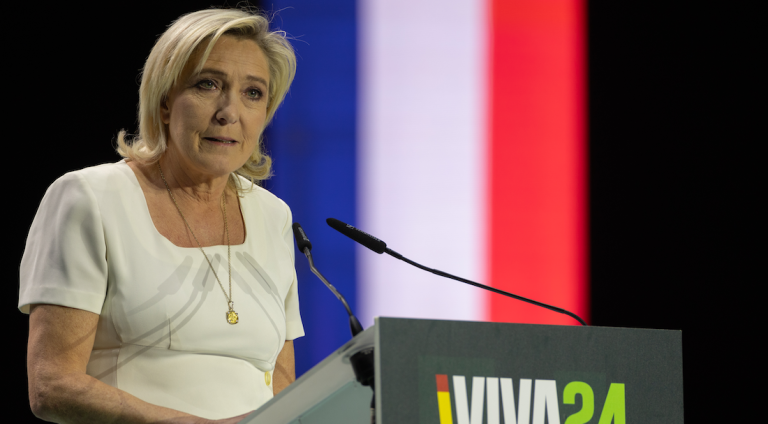
Paris — In a stunning display of international political intervention, President Donald Trump and Vice President J.D. Vance have thrown their support behind French far-right leader Marine Le Pen following her conviction on embezzlement charges, characterizing the legal proceedings against her as politically motivated persecution.
Le Pen, who has been found guilty of misappropriating European Parliament funds, now faces a ban on holding elected office—a penalty the American executive branch leadership has inexplicably chosen to challenge despite the conviction resulting from a years-long investigation and trial process conducted under French law.
“Another witch hunt against a strong conservative leader,”
President Trump posted on his social media platform Tuesday.
“The globalists will stop at nothing to silence those
who speak for the people. DISGRACEFUL!”
The American president’s characterization of the French judicial process as a “witch hunt” comes after Le Pen was convicted of embezzling approximately €4.5 million of European Parliament funds to pay her National Rally party staff for work unrelated to their European duties—a conviction based on extensive financial documentation and testimony.
Vice President Vance went even further in his criticism, stating in a nationally televised interview: “Banning political opponents from running for office isn’t democracy—it’s what happens in banana republics. The people of France, not judges, should decide who leads them.”

Legal experts across Europe have expressed astonishment at the American leadership’s apparent disregard for the separation of powers and rule of law principles that underpin both nations’ democracies.
“It’s remarkable to witness American elected officials suggesting that politicians should be immune from legal consequences,” said an international law expert in Paris.
“The French justice system operated independently and transparently throughout this process. The evidence was substantial.”
When asked about the specific evidence presented in the embezzlement case, a White House representative deflected, stating only that “the President believes political leaders are targeted unfairly around the world” without addressing the financial documents central to Le Pen’s conviction.
The statements from Trump and Vance have prompted diplomatic tensions, with the French Foreign Ministry issuing a rare rebuke: “France respects the sovereignty of other nations and expects the same courtesy. Our judicial system operates independently of political influence, as it should in any functioning democracy.”
Despite this response, Trump doubled down at a rally in Pennsylvania, telling supporters: “They’re doing to Le Pen exactly what they tried to do to me. When conservatives win, they try to put us in jail. It’s happening everywhere, folks, believe me.”
This claim drew audible gasps from seasoned diplomatic correspondents present at the rally, given that Le Pen’s case involved specific financial crimes substantiated by banking records, contracts, and employee testimonies gathered over a seven-year investigation.
Congressional Democrats have criticized the administration’s stance.
David Wilson stated, “It’s profoundly disturbing to see an American president undermining the legitimate judicial process of one of our oldest allies. The conviction wasn’t about politics—it was about misappropriation of public funds.”
Political analysts note the comments reflect a growing pattern of the Trump-Vance administration expressing solidarity with right-wing politicians facing legal troubles abroad, regardless of the merits of the cases against them.
“What’s particularly concerning is the selective application of their concern,” noted Dr. Rebecca Thornton, Professor of International Relations at Georgetown University. “They show no similar outrage when opposition figures in Russia, Hungary, or Turkey face legal challenges, suggesting their concern isn’t about democratic principles but ideological alignment.”
French President Emmanuel Macron has diplomatically avoided directly addressing Trump’s comments, though sources close to the Élysée Palace indicate significant frustration with what they view as unwarranted interference in France’s domestic affairs.
The National Rally party, meanwhile, has eagerly embraced the American support, featuring Trump’s comments prominently on their website and social media accounts. Party spokesman Henri Lefevre told French television: “When even the American president can see this is political persecution, it should be obvious to everyone.”
Ordinary French citizens interviewed expressed bewilderment at the American intervention.
“Do they even understand what she was convicted of?” asked Parisian shopkeeper Marie Clement. “This wasn’t some minor technicality—she took money meant for one purpose and used it for another. In any country, that’s called fraud.”
As diplomatic channels work overtime to manage the fallout from these statements, constitutional scholars in both countries continue to express alarm at what they characterize as an erosion of respect for judicial independence—a principle long considered foundational to functioning democracies on both sides of the Atlantic.
Trump, Vance Defend Convicted Right-Wing Le Pen, “Witch Hunt” (April 9, 2025)